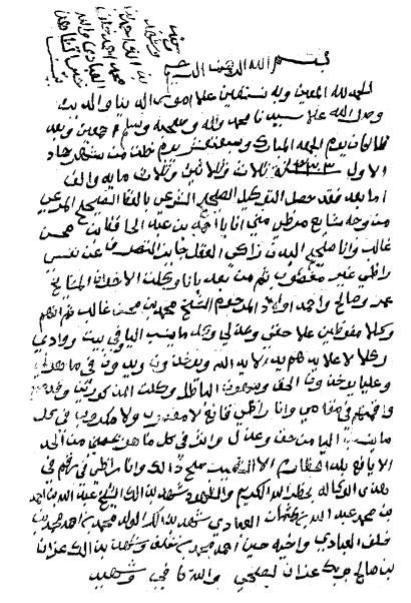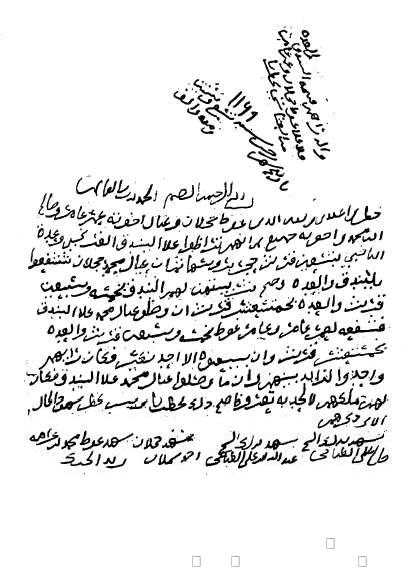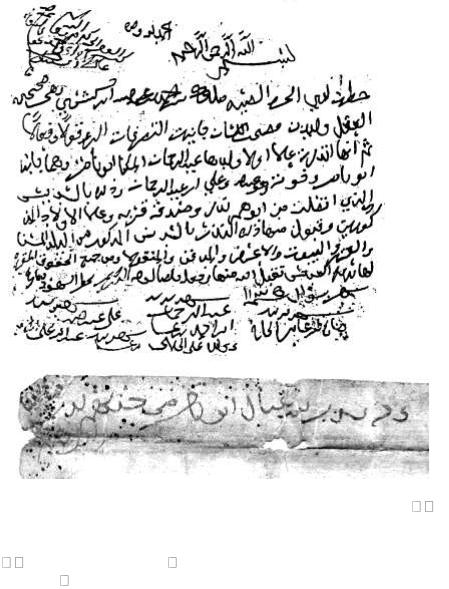
Naumkin_V_-_Islam_i_musulmane_kultura_i_politika_2008
.pdf
- The year 1277 [AD 1860–1861] – al-Wathiq bi-Allāh al-Lut f
‘Alī. aydar b. ‘I al-Dīn, servant of the noble law (shar ‘ah). On the reverse side of the document it is written:
The rightful legal effective wi ālah, with shaikh ‘Abd al-Ra mān b. Mu ammad b. ‘Abd al-Walī alayyar al-Yāfi‘ī setting his hand to it.
T
Technical terms
Matrū āt is ‘(property) left’, i. e. left after death of the owner and subject to descent.
Movable and immovable property – here: māl wa mutamawwil. Haqq and istihqāq – the exact meaning of these terms is unknown. Ālāt āra hānah – instruments of āra hānah. As explained by in-
formants, these are instruments for summoning members of the clan or tribe, probably symbolising, in conditions of a patriarchal economy, the high status of their possessor, giving him the right to obtain a certain part of the harvest gathered by the patriarchal family or clan. As patriarchal relations decomposed, the instruments of āra hānah began to devolve jointly with land during its sale, mortgage, and redemption of debts. Serving as instruments of karahanah were the horn, the trumpet and brass cymbals. As reported by informants, the instruments of āra hānah were used to inform the tribe of the coming of the war or of a joyful event.
To be at enmity – here: yu hās im wa-yughārim. This, in conditions of constant intertribal warfare in the Yāfi’ mountain regions, was of particular significance. Informants explained that the customs of blood feud here combined with the rules of ransom brought by Islam. There existed the concepts of makhs am and maghram – compensation for murder or mutilation and for the damage done to land under cultivation.
A shar ‘ah judge is h ā im shar‘ . This is a religious judge who examined lawsuits and conflicts between his co-religionists. On evidence from informants, this term could be used for both a Shāfi‘ī judge, a sayyid, and an Ismā‘īlī one.
At will – literally a ‘voluntary wi ālah’ – wi ālah hā’irah.
With compensation – mu‘awwad ah.
Without duress and compulsion – dūna i rāh wa-lā iğbār. Horses and sources of water – khayl wa ghayl.
Instruments of āra hānah – here: marāfi‘ āra hānah
Comment
244

Significantly, the bargain, in all probability, takes place between members of two distinguished clans of Yāfi‘. The draftsman of the do c- ument comes from the ‘Abbādī family,9 while the person to whom the property is handed over is a shaikh. One may suggest the following interpretations.
1.The member of the ‘Abbādī clan is in some kind of dependence on the second person, for instance, owes him money.
2.The member of the ‘Abbadī clan needs money and therefore virtually sells the property to the rich shaikh (the document stipulates the payment of compensation, but does not specify its sum).
3.The member of the ‘Abbādī clan, who has received inheritance, is in no need to increase his property or does not want it (it is not ruled out that he performs the functions of a religious judge or teacher), preferring to transfer it to another person for compensation, or maybe that person will simply act as a mediator during the sale of his property.
It is of interest that the document is referring to property outside
Yāfi‘ and even Yemen. The person who drafted the document most likely belonged to the clan whose members in their own time settled in a ramawt (the proof of this is the words ‘alad ramī al-Yāfi‘ī’).
The fellow tribesmen of the draftsman of the document must have been part of the warriors who had formed the guard of the nizam of Hyder a-
bad in India. Shaikh A mad b. āli died in India, having left an inhe r- itance to his daughter living in Yāfi‘ (he either had no children or bequeathed her a portion of property). This document tells of continued ties at that time between the Yāfi‘īs of Hyderabad, a ramawt and Yāfi‘ (links with the homeland and fellow-countrymen were also maintained by the Yāfi‘īs settled in Java, as well as in some Arab countries).
Let us cite another specimen of such a document.
9 As told by informants, members of that family ranked second after sultans and sayyids in terms of nobility.
245

Document No 8
In the name of Allah, Merciful and Compassionate!
Glory to Allah, the Helper, to Him we appeal for assistance in the affairs of this world and faith, and let Allah bestow His blessing to our lord Mu ammad, his relatives and cohorts, peace be unto all of them.
This is done on the blessed Friday of the seventeenth day of the month of Ğumādah al-‘ūlā, in the year 1333 [AD 12 April 1915].
246

And further. A rightful legal taw l was performed, in due legal process, with my consent and to my satisfaction. I, Bā A mad b. ‘Abd
al- |
āfi |
b. Muh |
sin Ghālib, am in good health and of sound mind, |
|||
acting independently, not under duress. |
|
|
||||
|
And |
further. I |
entrust the shaikhs, |
brothers ‘Umar, āli |
and |
|
Ah |
mad, |
sons of |
the deceased |
shaikh |
Muh ammad b. Muh |
sin |
Ghālib. They are my authorised |
wa ls with respect to my property |
|||||
and the property of my ‘adhal, the house and the wād that belonged to me. And let there be none over them except Allah. They receive everything I have and what is behind me, take the just and reject the u n- just. I put the aforementioned in my place and do it with my consent, without violence or duress. All that belonged to me and my ‘adhal, and [?]… from aladd and Yāfi‘ to the country of the a ramīs and al-Sha‘īb. This is right, and I write this wi ālah (guarantee) on my own free will. Present here are Allah the Generous and the witnesses.
This is certified by ‘A |
ān b. S |
ālih Bū Bak ‘A ān Las ba ī. And |
|
let the testimony of Allah be sufficient. |
|||
This |
has been written and certified by A mad b. Mu ammad |
||
A mad |
halaf al-‘Abbādī, and let Allah be the best witness. |
||
|
|
Terminological comment |
|
Wa |
l is a person acquiring the right to dispose of property. |
||
‘Adhal – family members: wife, children and sisters. |
|||
Wād – wadi, here: land. |
|
||
The country of the |
a ramis – |
a ramawt. |
|
Al-Sha‘īb is a mountain region in the region of Lah ğ, west of Yāfi‘.
Comment
This text refers to the transfer of all rights of ownership to three cousins in the father’s line, that is, this probably reflects a transfer of land within one clan from a poor family to wealthier ones. In this, like in other similar cases, it is unclear in what way the division of the land, property, etc., obtained takes place among those who obtain them, whereas it seems that it is frequently several persons who are brothers that frequently act as buyers or wa ls. This may reflect the procedure established among the tribes for the transfer of ownership by a person who, due to particular circumstances (debt, ilness, poverty, etc.), could no longer own it.
247

Among the documents at our disposal there is one which in fact is a deed of purchase, but in view of the fact that the purchase is specified by conditions, it is close to a document on the transfer of rights of ownership (wi ālah).
Document No 9
Done in the month of Rağab, in the year 1169[AD April-May 1756]. In the name of Allah, Merciful and Compassionate! Glory to Allah,
Lord of the Worlds! |
|
|
|
|
|
|
Those present, ‘Alawī and Sa‘d, sons of ‘Awad |
Hağlān, and his |
|||||
ephews ‘Umar, ‘Āmir |
and Sā |
alih |
, sons of |
Muh |
ammad, all |
|
brothers jointly agreed |
[on the |
sale] of an Arab |
gun |
nahb |
and a |
|
powder-flask nahib |
for ninety |
hard qurush |
in cash. |
For the |
||
248

tashaffu‘ the sons of Muh ammad Hağlān laid down a condition that the selling-price of the gun should be seventy five qurūsh and that of the powder-flask fifteen qurūsh. And if Muhammad’s sons agree to that condition, they will give the gun as shuf‘ah to ‘Umar ‘Amīr and ‘Āmir ‘Awad for 75 qurush and the powder-flask for 15 qurūsh, but if the latter sell those things to some na r, then let what will be above the price be divided into equal parts. If, on the contrary, Muhammad’s sons do not agree to this, let them and none other own them. This sale is rightful, in presence of witnesses.
Wittnessed by |
Wittnessed by |
|
Shaikh Sālih |
‘Alī alabbā‘ī |
Shaikh ‘Abdallāh ‘Alī Alabbā‘ī |
Wittnessed by |
Wittnessed by |
|
Hağlān Ah |
mad Shamlān |
‘Awad Muh ammad |
|
|
Gharāma [?] |
|
Terminological comment |
Na hb |
is the name of one of the Yāfi‘ī clans, whose members set- |
tled in a |
ramawt; the names of both the gun and the powder-flask |
were derived from it.
Tashaffu‘ means a bargain negotiated with a fellow tribesman (shaf ‘, mushaffa‘).
Shuf‘ah is a synonym of tashaffu‘.
Na r is an alien; a person belonging to another tribe.
Comment
What is interesting about this document is the conditions of the deal: things are sold to tribesmen at a preferential price and in the case of their resale to a stranger they must be equally divided. The prices of the gun and the powder-flask, as compared to the prices of land and the cost of its development relating to roughly the same period, seem very high (gun = 80 sq. m of waste land, powder-flask = 18 sq. m).
The third kind of document is the testament (was iyyah). In Yafi‘ we examined some testaments kept in the families. They are executed in compliance with the same rules, that is, with a registration of the names of the witnesses, certification of the testator’s legal capacity, the acc u- racy of the conclusion of the act of inheritance, and so on. Unfortunately, we do not have at our disposal any documents which would allow us to judge on the rules of inheritance of property in the families, which, it is not excluded, somewhat differ from those for the entire Muslim
249

world. Let us name one document on inheritance, which, in our view, is out of the ordinary.
D
Document No 10
Glory to Allah alone!
It has been certified that all that belongs to ‘Alī Abdallāh is handed over from him to Muhammad Sa‘īd al-Mushaffa‘. He becomes the owner of the house and the wād and undertakes to give them presents hadiyyah and qadiyyah, and also, if they are indebted, he must pay for them. Muhammad Sa‘īd must address the ‘umumiyyah and what they believe [to be their due], he must pay for all of them.
Done in presence of the undermentioned witnesses in the month of Ramad ān, in the year 1171[AD May-June 1758].
Wittnessed by |
Wittnessed by |
Wittnessed by |
S ālih Muh |
ammad |
Qā’id Sa‘īd āmid Abū |
Nās ir al-Shaykh
And let Allah be content with this testimony.
Terminological comment
Wād – wadi, here: land.
250

Hadiyyah wa qadiyyah – seep.
Fidyah – supper during the celebration of breaking the fast in the month of Ramad ān.
‘Umūm yyah – male cousins in the father’s line which bear responsibility for the fate of female cousins.
Comment
Informants say that the person at whose will this document is ex e- cuted – ‘Alī Abdallāh – has no sons but only daughters who will have to be supported by their husbands when they get married in the future. Therefore on reaching advanced age he bequeathes to his relative (a man from his clan) his house and land, which the latter has to ta ke care of. In the process, the relative, Mu ammad Sa‘īd, undertakes to send to the daughters, sisters and wife of ‘Alī Abdallāh holiday presents (meat, bread, and so forth), and also provide supper for them after the fast in the month of Ramadan. Besides that, if the daughters and sisters of ‘Alī Abdallāh turn out to be husbandless, then Muh ammad Sa‘īd assumes an obligation to endow them. If, on the other hand, he wishes to sell the land, he must consult their male cousins in the father’s line, as their decision is considered to meet the interests of the women of this family.
251

Document No 11
In the name of Allah, Merciful and Compassionate!
Attending was a free lady, the daughter of ‘Abd al-Rah mān Ahmad alashhī, of sound mind and body, good behaviour, words and deeds, authori ed to dispose of the property of her father ‘Abd al - Rah mān called Abu Nās ir, jointly with her brothers Abū and ‘Alī ‘Abd al-Rah mān, to wit: the sixth part of what had passed to her and her brothers from their father as children, and she accepted the aforementioned sixth part which accrued to her, consisting of irrigated land,
‘atar land, buildings and immovable property, madfan, movable property, with all her legal rights, and this was done, as certified by Allah, in presence of witnesses, by the law of Allah, in the month of Shawwāl of the year 1135[AD 16 July 1723]: āli b. Ğābir ‘Amir alağğ, ‘Abd al-Ra mān b. Abī A mad, and ‘Abd al-Rabb ‘Alī alağğ.
252
Terminological comment
Land – here: balad.
Madfan is a granary.
Comment
This document testifies to a woman’s taking over the sixth part of the legacy of her father (as it is known, according to the shar ‘ah the daughter receives half of what accrues to the son). The document is clearly drawn up not just about the inheritance of ‘Abd al-Ra mān’s property by three children, but above all about the transfer of a portion of property precisely to the daughter, which may have been necessary for the family of her fiancé or husband.
The fourth kind of documents is the mortgage deed (ruhūniyyah). As a rule, land was mortgaged for money received from the person with whom the owner of the land contracted the bargain. It was stipulated that if the debt were not repaid by a definite time, the land and other property would go to the lender. In some cases the deed was executed as late as at transfer of property to the lender, when the owner had already been unable to repay the debt. The document cited below is of that kind.
Document No 12
هدحو لله دمحا نيثلاثو ثلاث ةنس لولاا دامج رهش نم تلخ موي رشعتعبسو ةعمجلا موي ناك امل هنا يتمذ يفو يدنع ناب بلاغ نسحم نب ظفاحلا دبع دمحه اب انا لوقا فلاو ةيام ثلاثو نسحم نب دمحم دلاولا موحرملا دلاوه دمحهو حلاصو رمع نهوخلاا امهو نيروكذملل هجو لاا )؟(...رجح شرق نينامث هدعو هتبسحو هتلمج امزلا اقحو اتباث انيد )؟(...بلاغ دمحم دمحه نب للها دبع كلذب دهش دوهشلا روضحب )؟(...يسفن نع يظار اناو هلك يقح دلاولاو دلاولاو يدابعلا فلخ نب دمحم دمحا دمحم دلاولا كلذب دهشو يدابعلا نامثع نب نب دمحم كلذب بتكو يحبصل كب نب حلاص نب نازع كلذب دهشو فلخ نب دمحا نيسح
نيدهاشلاا ريخ للهاو يدابعلا فلخ دمحا
Glory to Allah alone!
This is executed on Friday on the seventeenth day of the month of Ğumādah al-‘ūlā, in the year 1333 [AD 12 April 1915]. I, Bā A mad
253
